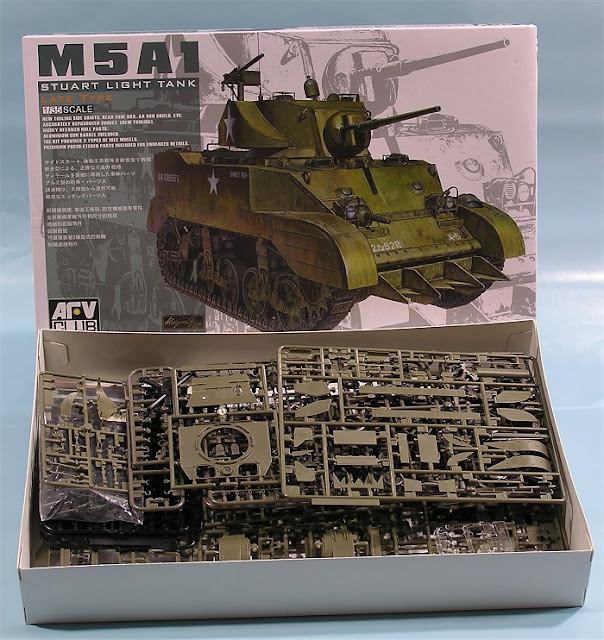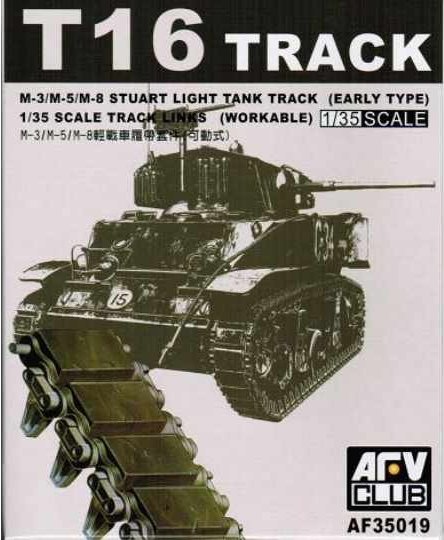For this project I'll
be tackling the AFV Club M5A1 Late. This project
was originally conceived as part of an online model build. While I
will try to finish this within the allotted time my track record is...shall we say "Not the Best"
I always like the boxy little look of the Stuart
family of fighting Bang Boxes. But with its more refined lines and sloping
armor the M5s looked more interesting to me.
I knew I wanted to model a late version with the two prominent features;
the Anti-Aircraft Machine Gun shield located on the right side of the turret
and the large stowage ben situated on the rear plate.
After pouring over my reference material I
came across two photos of M5s that I really liked. While accuracy is important
I’m not a slave to it and what I wanted was to build an overall representation
of an M5 in the European Theater of Operations as it would appear in the field.
So I decided to combine the two photos
into one model.
The first photo is from the well-known book by
Squadron, Stuart in action.
This picture captures so much of what I
wanted for the look of an M5 operating in the field. I mean this just screams “BUILD ME!!”
Before I get to building I like to sit down
at the computer and preform a little photo analysis. I picking out the features
that I want to include during the build and identify any mystery items. The blow picture shows kind of how I do that.
As you can see since this is from the front I’ll
use other suitable photo reference for the remaining parts of this little gal.
The next photo is taken out of Concord’s U.S.
Light Tanks at War,...
....And the photo analysis.
Two other photos that inspired me are of an
M5 restored and dressed up in Marine Corps colors. Not exactly ETO but you can
see why I like these. Unfortunately I
pulled these outstanding photos from a web site quit a long time ago and I don’t
have any information on them.
Next up are some more inspirational pictures
that I have collected over the years from various sources but mostly from web
sites. The focus of these is stowage, I love me some stowage, and how it is
placed on the respective vehicles.
The
basis for this build is the AFV Club M5A1 Stuart Late Type, AFV35161, in 1/35 Scale. This
kit contained all the features noted above that I was looking for and is really
the only serious choice as the Tamiya M5 would be more work then I was looking for. PMMS
has a nice review of AFV's M5A1 Late
The additions I planned to use for this build are
the AFV Club T16 Tracks (AF35019), Verlinden’s M5A1 Stuart Interior Update (VER
1562) and RB Models barrel replacements for the 37mm Gun and the .30 cals (35B24
and 35B82).
While the Verlinden Interior Update is not
really made for this kit I figured it would be a good place to obtain complex
shapes such as the transmission housing and the turret floor. Based on the
level of detail I wished to achieve I would assess the other Verlinden parts to
see if I would use them or scratch build new ones. However some care will be needed when using
this set to ensure parts are placed in the correct areas and that the Verlinden
items are the correct size. Either way using some or all of the Verlinden parts will
help save a little bit of time and sanity. RB Models make some excellent barrel
replacements and are reasonably priced but are hard to come by here in the
States. I was able to locate a supply
from our Canadian neighbors to the north The Barrel Store…Thanks guys!
Construction of the Lower Hull, Suspension and
the T16 Tracks
The
lower hull is a multi-part affeir, not the old style tub set-up. Once the parts where removed and clean you
attach the sides. The first thing you’ll
notice is that AFV kits are NOT Tasca kits so the fit is not as good. That’s not to say it is terrible, just a
little patients will be needed. Several
years ago I picked up a couple of right-angle clamps from a company here in the
states called Micro-Mark. These
clamps come in two sizes,Original 'Right Clamp'and Long 'Right Clamp'.
I used the clamps to assist in making sure the hull sizes went on
correctly. Once the hull side where attached I then built up the rear of the
lower hull as per the instructions.
The suspension was also build according to
the instructions. Only some minor bolt head details were add to the road
wheels. On the right side I used the early pattern idler wheel and an open
spoke road wheel with the opening on both plated over. The idea here is to display them as field repair
replacements using early parts.
The AFV T16 tracks are nicely detailed and go
together rather easily despite their rather small size. To help the process and making sure the tracks
stay somewhat straight I built a simple jig. I was fortunate to locate some
pre-cut bass wood that was the same width as the track pad allowing the end
connectors to be fitted. I work in groups of three track links and then made up
the track runs as needed. Once the tracks were fitted the extended end
connectors (EEC) (duckbills) are attached. According to the reference photos
being used for this build the EEC were attach to every-other end connector. This
adds a great little detail to the overall model.
One last detail item that was added was the
texturing of the track faces to show some ware-n-tear. This was done using a
dermal tool with a cutting bit. With the
tracks installed that wraps up the major construction for the lower hull, only
a few odds-n-end remained.
Here is sneak peek of the next phase of this
build…The interior!
Be sure to checkout more photos of this build under the "Little Sure Shot" tab at the top of this page.
Thanks for stopping by and I hope you enjoyed your stay.
Thanks for stopping by and I hope you enjoyed your stay.
Please feel free to leave any
comments and or questions.






























No comments:
Post a Comment